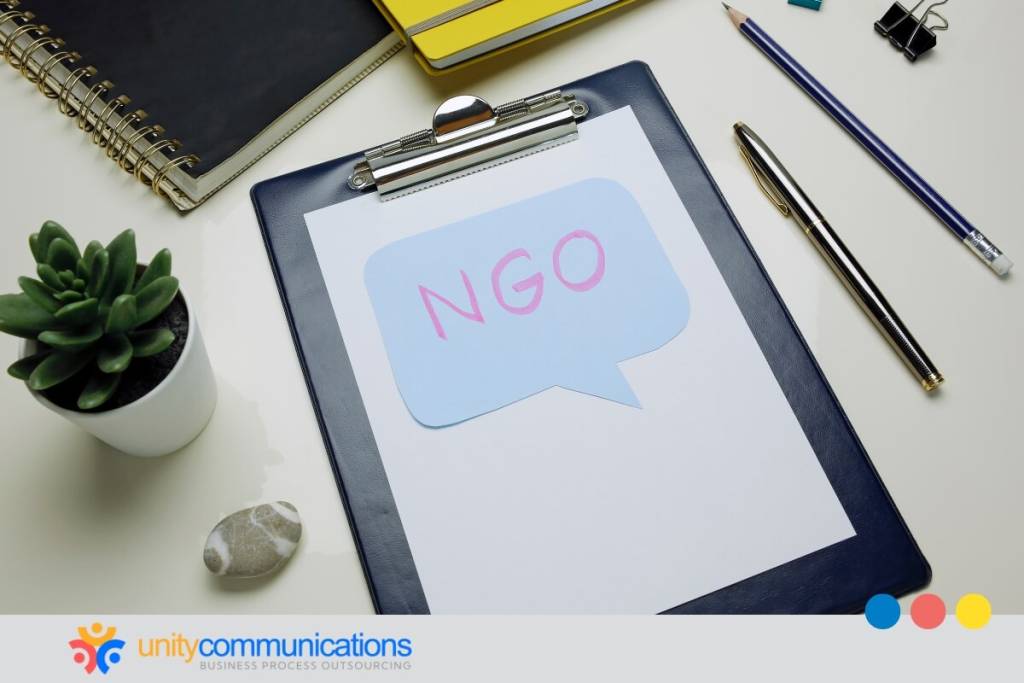Table of Contents
Businesses need competent staff to perform day-to-day tasks (e.g., customer support); otherwise, operations quickly halt.
A business process outsourcing (BPO) provider’s contribution to non-governmental organizations (NGOs) might not be immediately apparent. However, third-party partners offer plenty of benefits to the niche industry, beginning with the ability to source hundreds of workers for secondary or specialized tasks.
For NGOs that must maximize funding and resources for their causes, BPO services are a practical investment capable of reducing costs and raising profits. Discover how in this article!
BPO services for non-governmental organizations

It is important to establish that outsourcing is not a cure-all for every business woe. Some roles cannot be outsourced. For instance, although third-party providers are reliable headhunters for talent, the client company and its leadership ultimately decide whether to retain a team member.
If you are unfamiliar with BPO firms and their offerings, here is a quick look at the critical services they can provide for NGO clients:
- Integrate the latest tech tools. Unless tech literacy is one of their advocacies, NGOs often struggle to modernize their operations. BPO vendors resolve this issue by providing a client NGO and its employees with software that meets their needs, including custom-made apps.
- Streamline back-office jobs. Reducing busy work is a major concern for NGOs that want to maximize their budgets. Back-office offshoring service providers employ automation tools, making them well-equipped to address clutter and overhaul and scale business processes.
- Assist in talent acquisition. NGOs struggle to attract top financial and managerial talent, which makes filling key roles challenging. Outsourcing recruitment needs to BPO firms eases this process, ensuring hires fit in excellently and have similar values.
- Handle all bookkeeping duties. NGOs face heavy scrutiny on how they handle money because they rely on donors for support, leaving no room for error. BPO firms employ accountants who accurately and meticulously handle financial data and produce reports.
- Manage critical HR functions. In addition to headhunting, NGOs benefit from outsourcing human resources (HR) functions such as payroll, training, and compliance. In particular, regulatory compliance is invaluable because it affects an NGO’s reputation and helps prevent costly mistakes.
- Perform research and analysis. Data and well-supported research drive the public to fund NGO projects; convincing donors is impossible without these documents. The BPO market provides services for nearly every need imaginable, including research.
- Design digital marketing plans. Building a sales funnel for a non-profit is difficult, given that people provide support mainly based on shared values. BPO providers use their expertise to design marketing strategies that connect NGOs with their intended audiences.
- Guarantee high-quality content creation. People approach and support NGOs because of their vast expertise and dedication to a particular subject matter or concern. Turning this knowledge into accessible content is not simple, but BPO companies accomplish it by creating blog posts, website copy, and more.
- Enhance customer experience. BPO providers often take on call center and customer support tasks for non-governmental organizations. But what can the BPO call center do for NGOs specifically? It performs various tasks, including taking donor calls and responding to stakeholder concerns via phone, email, or online chat.
- Ensure robust data security. NGOs collect and process large volumes of personal data, making data storage and safekeeping a critical concern. BPO firms not only set up critical infrastructure for this purpose but also train staff to use and manage it.
How NGOs benefit from working with BPO firms

Partnering with a BPO provider lets non-governmental organizations streamline daily operations and unload inefficient spending. Everything from back-office duties to technical and complex tasks can be outsourced cost-efficiently without sacrificing quality or causing delays.
At this point, you should be asking, “Why BPO?” rather than “What is BPO?” The next section explores the top reasons why your NGO should invest in BPO solutions.
Reduce the influence of human errors
Although BPO vendors continue to rely on human workers, they also support automation in the workplace. Their marketing teams use software to support lead generation initiatives and chatbots to ensure seamless and error-free customer engagement.
BPO companies employ the same tools for NGO processes, including generating leads through website newsletter sign-ups or contact forms. These technologies allow NGOs to minimize human mistakes, which is significant considering something as simple as incorrect data entry can result in lost opportunities to market, connect, or collect.
BPO firms provide valuable technical and information technology (IT) support that helps mitigate or eliminate human errors. Organizing data storage, managing system access, and training staff to use advanced software are just some of the many crucial responsibilities they can shoulder for you.
Upgrade NGO logistics and planning
Given how central data and planning are to their services, BPO vendors are well-equipped to resolve logistics issues or revamp lackluster strategies. Experienced and skilled operations and administrative assistants are among the greatest assets they can provide to the NGO.
Take relief aid distribution, for example. An NGO must coordinate with the venue and their team, collect the donations, arrange the relief goods, and oversee the distribution. Organizations with limited staff would have to allocate manpower to this project, often putting other plans on hold.
Complex tasks highlight the value of involving a BPO provider in the projects of non-governmental organizations. Third-party partners can supply more workers and document the relief aid process, creating website, social media, and blog content about the event. BPO companies also leverage link-building to reach people and improve branding.
Protect sensitive customer information
Data breaches are projected to become more commonplace in the coming years as more and more of people’s daily activities move online. NGOs and other organizations that manage high volumes of sensitive data are prime targets for hackers, especially those planning to steal financial data.
Low tech and online literacy among staff (and even executives) is an issue that exists in all industries, and leaders are starting to wake up to the fact. A 2023 ThoughtLab study reports that 46% of surveyed organizations plan to invest more in upskilling cybersecurity and IT staff.
Though the BPO industry is also rushing to reinforce cybersecurity measures, many BPO vendors are prepared and can introduce basic skills and advanced tools to their NGO clients. From there, scaling and modernizing security becomes a simpler and smoother process for all.
The bottom line

Outsourcing is a smart way to expand operations without significant spending. The needs of NGOs and the services of BPO firms are also perfectly aligned. Hiring a BPO firm lets NGOs reduce costs and streamline work simultaneously.
Let’s connect to learn how we can help streamline your NGO’s processes and safeguard your customers’ personal information today!




